Three California women — Lisa Curtis, Katherine Harvey and Aishwarya Iyer — are making their mark in the highly competitive food industry by building unique, better-for-you brands — and they’re doing it their way.
The millennial food entrepreneurs — Curtis, founder and CEO of Kuli Kuli Foods; Harvey, co-founder and CEO with husband Ryan of Bare Bones Broth; and Iyer, founder and CEO of Brightland — have led their companies from small retail to big retail in a notably short period of time using a healthy dose of creative acumen, a mission-based focus and relentless drive.
These founders of young fast-rising food companies, with previous careers in other industries, have grown their respective businesses by creating a brand identity and shopper demand first via direct-to-consumer sales, online merchants and sales through smaller brick-and-mortar stores, then once achieved, moved into big retail strategically.
Curtis, Harvey and Iyer each unpack their journeys here.
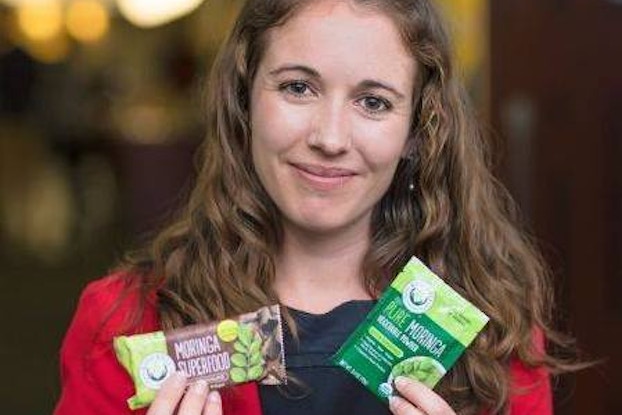
Serendipity meets social mission: Lisa Curtis, founder and CEO, Kuli Kuli Foods, Oakland, Calif.
Founding story
Curtis didn’t intend to start a food company, but a stint in 2010 as a Peace Corps volunteer in a small village in Niger, West Africa changed that.
As a vegetarian working in the village, the then 22-year-old was eating mostly rice and millet, which left her feeling fatigued. When she mentioned this to the women working at the village health center, they suggested she try eating a local nutrient-rich plant, moringa.
“I tried it, mixing the moringa leaves with a popular local peanut snack called kuli-kuli, and it made me feel better,” Curtis told CO—. “I did some research and thought, ‘This plant is amazing.’ So I asked myself, ‘How can I help people benefit from it?’ That is what inspired me to found Kuli Kuli Foods.”
Returning to the United States in 2011, Curtis started Kuli Kuli Foods part-time while working full-time as communications director for a start-up in the solar energy industry. In 2013, she raised $53,000 on crowdfunding site Indiegogo and in 2014 raised $152,000 on Agfunder. She followed that up by landing a major investment from Kellogg’s 1894Capital corporate venture capital arm.
Curtis then recruited three co-founders and the team created its first product, a line of moringa-based energy bars. Then it was off to the races: In 2014, Kuli Kuli Foods launched its products online and in grocery stores, starting with Whole Foods Market in Northern California, followed by numerous independent chains.
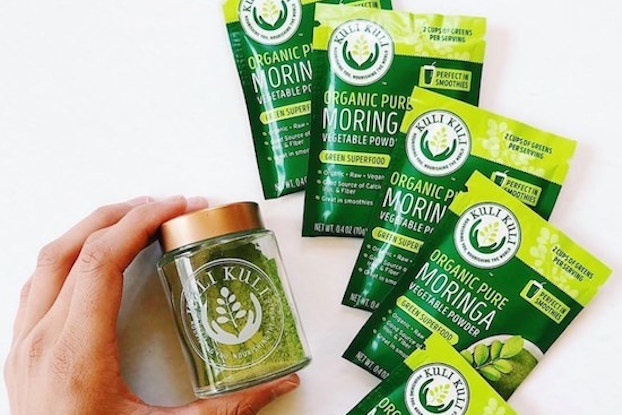
The road to big retail
In five years, Kuli Kuli foods has gone from selling in a handful of stores to placement in over 7,000 stores, including big grocery chains like Albertsons, Kroger, Wegmans, Sprouts Farmers Market and Whole Foods nationally.
“We’ve been able to get into big retailers by building success in one retail chain and then taking that sales story to other retailers and helping them to understand the impact Kuli Kuli’s moringa products could have in their set,” Curtis said. “We’ve largely met retailers at trade shows and then followed up with them persistently but politely from there.”
Market niche
Curtis and her team have done something unique in the food industry, which is to build and market a brand of products consisting of an ingredient, moringa, that previously didn’t exist in the market. As such, Kuli Kuli Foods not only is carving out its own niche, it created it.
The fact that the moringa-based products are “unique, high-quality, natural and organic, and sustainably sourced directly from a network of small farmers, has allowed the company to carve out its niche by differentiating itself with retailers and consumers,” she said.
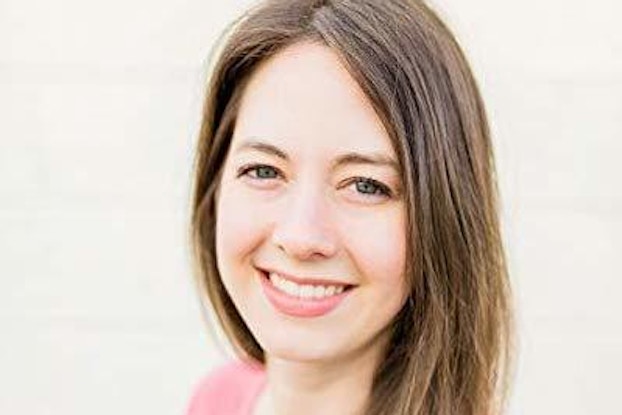
Writing the book on bone broth: Katherine Harvey, co-founder and CEO, Bare Bones Broth, San Diego, Calif.
Founding story
Six years ago, Katherine Harvey was working away at her day job as a business reporter and writer for the San Diego Tribune while her husband Ryan, a chef, was focusing on the couple’s bone broth startup venture, Bare Bones Broth.
“I was involved, but it was mostly Ryan’s thing at the time because I was focused on my journalism career,” Harvey said.
But a call from a book agent changed all that. The agent asked the Harveys to write a book about bone broth, and, being a writer, Katherine Harvey said yes, and went to work with the agent shopping the book to publishers. The couple found one, HarperCollins, which published "The Bare Bones Broth Cookbook" in 2016.
“Through the process of shopping and pitching the book, I realized I could leave the paper to devote full time to Bare Bones Broth,” Harvey said. “The book advance provided a financial cushion, and it was what I wanted to do.”
Harvey said the company is a total partnership with husband Ryan. She carries the CEO title, but they share duties across all functions — from marketing to operations — complementing each other’s strengths and weaknesses.
Both are foodies, too. Harvey’s parents regularly made their own bone broth, which she loved and learned to make, and bone broth was the first thing Ryan learned to make in culinary school.
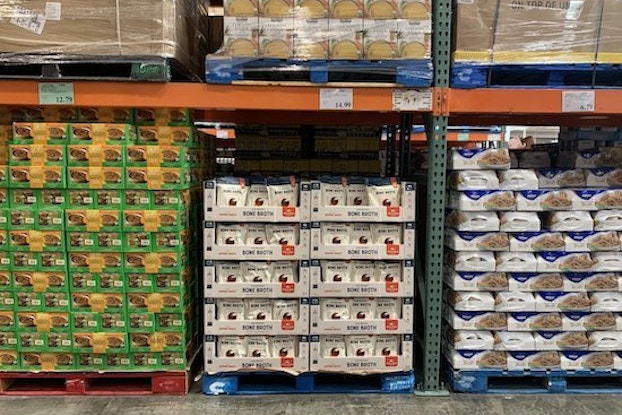
The road to big retail
Bare Bones Broth started out selling directly to consumers on its website and continues to, which allows the company to stay close to consumers, learning from them along the way.
From there, the company launched its products into food cooperatives and independent grocery stores, which, along with selling directly to consumers, allowed the entrepreneurs to refine the product line. For example, the first product was frozen. However, with the help of consumer and retailer feedback, Harvey said they decided to change to shelf-stable products.
Bare Bones broth landed its first big retailer, Wegmans, by sticking to their brand bones, Harvey said.
“Wegmans found us at the Natural Products Expo West trade show,” she said. “They asked us if we would do private label. We said no. I followed up after the show and told them we would consider private label if they would bring in our branded products. They brought in our brand, and never asked us again about private label, so it was a win,” Harvey said.
In addition to Wegmans, Harvey said Bare Bones Broth has penetrated numerous other big chains, including H-E-B, Harris Teeter, Sprouts Farmers Market, Costco and Whole Foods, through its brand reputation, relationship building and persistence.
“Whole Foods took us five years to land,” Harvey said. “We submitted our product line time after time, year after year. Finally, a new buyer happened to be someone we had worked with very briefly at Harris Teeter. She remembered the brand and had some questions about changes we had made to the products, so brought us in for a meeting. We did our best to capitalize on the fact that she already felt invested in the brand — and it worked.”
Market niche
Bare Bones Broth specializes in giving wellness seekers convenient, nutritional food and beverages they can trust to help them thrive, Harvey said. “We are not a value brand, but a brand that delivers consistent, high quality and healthy-first products with maximum convenience in mind. That’s the niche we’re carving out in the market,” she said.
We are not a value brand, but a brand that delivers consistent, high quality and healthy-first products with maximum convenience in mind.
KatherineHarvey, co-founder and CEO, Bare Bones Broth
Dig Deep
These female entrepreneurs each started their brands with a mission meaningful to themselves personally. Do you have a passion that can be turned into a business? Learn how to plan it out.

Olive oil as modern art: Aishwarya Iyer, founder and CEO, Brightland, Los Angeles, Calif.
Founding story
Aishwarya Iyer, who, prior to founding Brightland spent 10 years working in technology and venture capital, is on a mission to bring fresh, authentic and unadulterated olive oil to consumers, and she’s doing it in a unique and modern way. The line includes olives grown by a family farm in California’s Central Coast, and packaged in white, powder-coated bottles adorned with artwork that evokes the art of Matisse and the California lifestyle. It’s food meets art: Olive oil as part of a modern lifestyle.
“While living in New York for many years I learned that much of the olive oil that Americans consume is rotten, rancid and adulterated, so I wanted to do something about it,” Iyer said. “So after moving to Los Angeles, I started visiting olive farms and learning more about olive oil. I got excited about California olive oil and decided I wanted to champion American-made, beautiful extra virgin olive oil that is also elevated.”
Iyer said she started her journey by asking herself, “What would a modern olive oil look like from product to brand?”
She decided the winning combination was quality California olive oil in an exquisite bottle, with a focus on authenticity, transparency, wellness and lifestyle. She launched Brightland in 2018, and in one year her brand has received acclaim from chefs, retailers and consumers, she said.
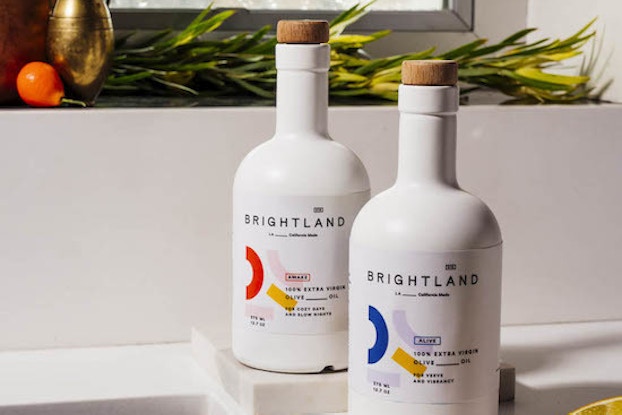
The road to big retail
Iyer is methodically charting her retail distribution strategy — and it’s working well, she says. Befitting a brand with a modern twist, she’s using modern channels of distribution like direct-to-consumer, subscription models and lifestyle and wellness-focused online retailers such as Goop, Bubble Goods, Cap Beauty, along with tony brick-and-mortar retailers like Neiman Marcus. Next up are upscale and health-geared grocery chains.
In June 2019, Iyer formed a partnership with Los Angeles-based, healthy fast-casual restaurant chain Sweetgreen, which will use her new, custom-produced Brightland + Sweetgreen extra virgin olive oil in its stores.
“I’m excited about being in retail outlets and places olive oil isn’t expected to be in, as well as more traditional outlets,” Iyer said. “I want to be in front of tastemakers.”
Her strategy is working because tastemakers are talking up Brightland, which, in turn, is leading to retailers big and small seeking to stock her olive oil. Neiman Marcus wanted the brand, for example, and Iyer decided it fit her big-retail criteria.
Market niche
Iyer has positioned Brightland at the intersection of authenticity, quality, transparency, lifestyle and wellness, which are all hot buttons of millennial generation consumers. Her popular Instagram feed tells the story behind Brightland’s modernist lifestyle and wellness positioning.
“The philosophy behind Brightland is to live more awake, alive and aware,” Iyer said.
CO— aims to bring you inspiration from leading respected experts. However, before making any business decision, you should consult a professional who can advise you based on your individual situation.
CO—is committed to helping you start, run and grow your small business. Learn more about the benefits of small business membership in the U.S. Chamber of Commerce, here.







